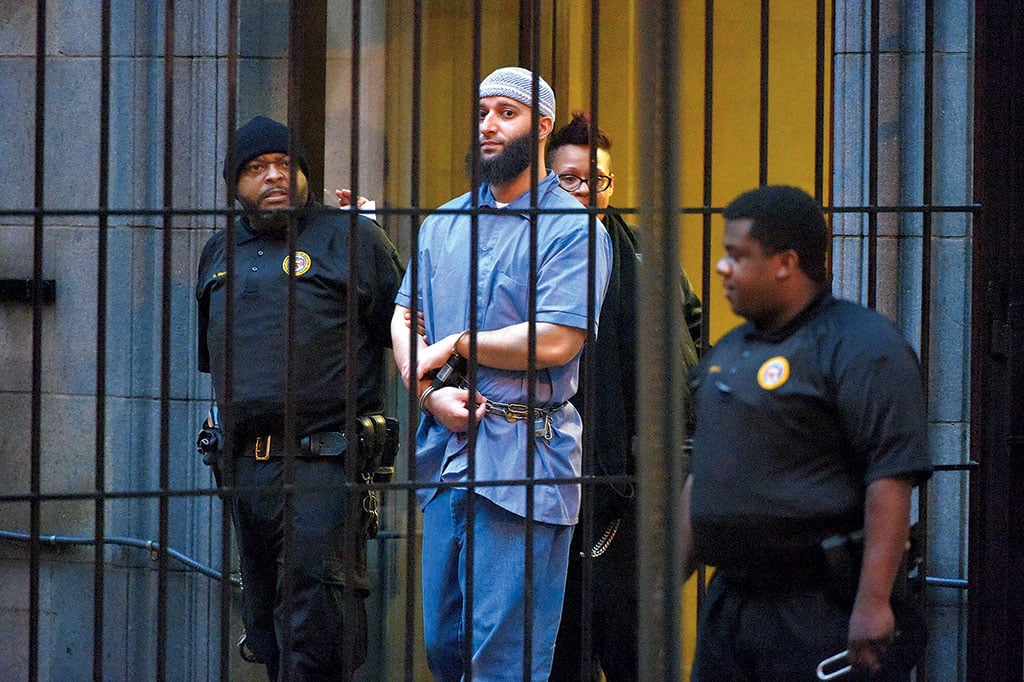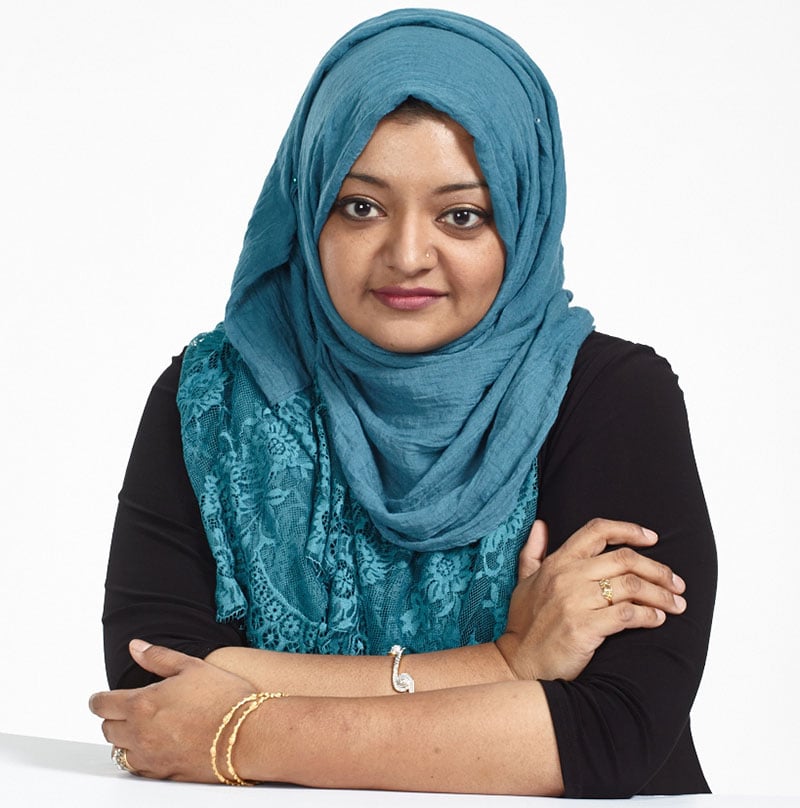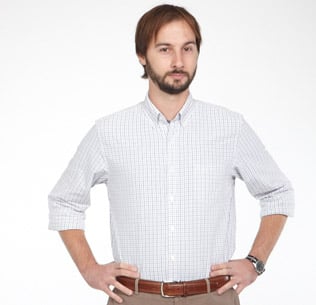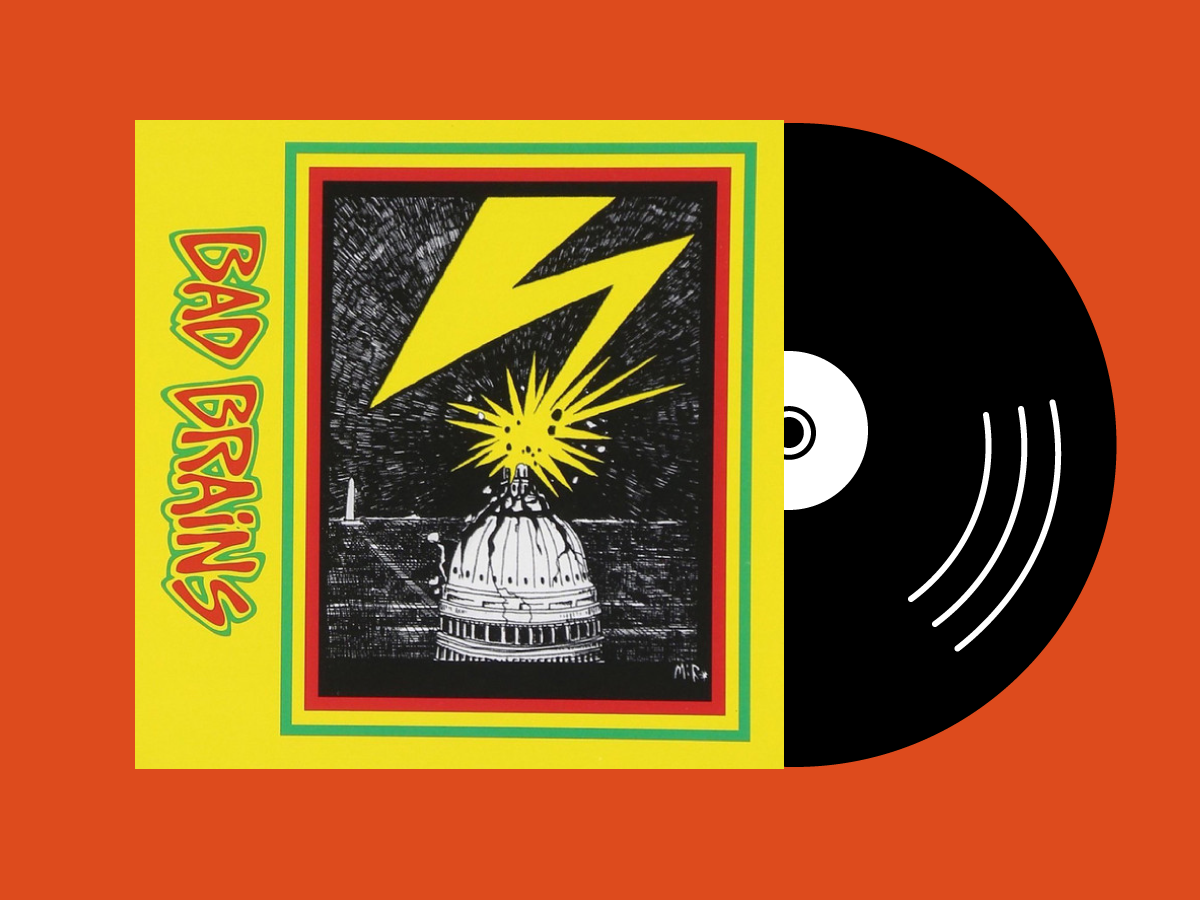Two years ago this fall, there seemed to be only one topic of conversation at the water cooler: Did Adnan do it?
Nobody could stop parsing the latest developments in Serial, the weekly podcast about the 1999 murder of Baltimore teen Hae Min Lee, hosted by This American Life reporter Sarah Koenig. The phenomenon all started with an e-mail to Koenig from Rabia Chaudry, a Washington lawyer, fellow at the US Institute of Peace, and family friend of Adnan Syed, the ex-boyfriend found guilty of the murder. Chaudry believed that Syed, who has been in prison for the past 16 years, was wrongfully convicted, and she wanted fresh eyes on his case. Her effort came to fruition on June 30 when a judge granted him a retrial based on evidence featured in Serial and in follow-up investigations.
Now it’s Chaudry’s turn to take the mike. Her new book, Adnan’s Story, out this month, uses primary documents such as police reports and frequently goes into even more detail than the exhaustive Serial. Also exciting to amateur internet sleuths and anyone else left unfulfilled by the podcast’s inconclusive ending: Chaudry offers a whole new theory of Hae’s murder.
Chaudry spoke with Washingtonian about the book and how it connects to her day job as a Washington policy person.
Where were you when you heard the news about the retrial, and what went through your head?
I was at home alone when Justin [Brown, Syed’s lawyer] called me and broke the news. I was rather emotional, sobbing, trying to process it. Hearing him say “We won a new trial, Rabia” blew my mind. It’s what we’ve hoped for all these years but hard to process that it has actually happened.
Given the extensive coverage of Adnan’s case after Serial, why was it necessary to write a book about it?
It hadn’t even occurred to me until I was contacted by one of my agents and she explained something I didn’t realize—that somebody else is going to write the book. There were little points of frustration with Serial where we felt it left out important things, and when my agent put it that way, I thought if somebody’s going to write the book, shouldn’t it be somebody who can really fully represent Adnan?
How did he participate in the writing process?
I posed questions, and he wrote me letters. We talk two or three times a month. He’s doing fine—he was having some medical issues, but he’s been getting physical therapy.
You write extensively about a person you think police need to investigate more fully.
Don Clinedinst [Hae Min Lee’s boyfriend at the time of her murder]—his investigation was completely flawed. We have absolutely no idea where he was that day. I’m not saying that I think he’s guilty. I just think that he deserves another look.
You write a lot about anti-Muslim bias in Adnan’s case, which was 17 years ago. Today that vilification seems even more inflamed with the rise of Donald Trump, the Brexit vote, so much talk of nationalism.
This bias that emerged in Serial really caught the public’s attention, whereas we Muslims know it’s existed for years. Every time there’s a US election, the activist community amongst American Muslims braces itself. We know it’s coming—we just never expected it to get this dangerous. A year ago, I would’ve said that the country that voted in Barack Hussein Obama twice is not going to tolerate the inflammatory rhetoric we are seeing from at least some parts of the conservative party. I would’ve just refused to believe it. But that has been turned on its head.
Something remarkable that people don’t know is that, very quietly, the LGBT community has been an ally for us over the last 10, 12 years. So when [the murders at the gay nightclub in] Orlando happened, every LGBT activist came out and said, “You are not going to use this incident to attack Muslims,” and that’s the result of having built those relationships. There’s a lot of layers to unpack in the book connected to current events.
How did Adnan’s case change your thinking about our justice system?
We give way too much weight and privilege to existing processes. In Adnan’s case, you’ll hear things like the prosecutor saying, “You gotta work with the witness you have, even if you catch him in a lie.” No, actually, you don’t. I’ve been trying to get law firms and students to challenge the idea that an established practice has so much weight that we cannot change as a system.

How has Serial affected your day-to-day life?
I just gave the keynote address at an event at the US Institute of Peace, and the introduction they gave—which should have all been about my legal or national-security work—included Serial. I spoke at a UN panel about women in conflict, and even in my invitation for that, they were like, “You know, maybe you could address a little bit about Serial.” I said, “That has absolutely no relevance to this topic.” For me, it’s part of my personal life and not part of my professional life at all.
As a lawyer, you’ve worked at the intersection of Muslim communities and law enforcement. How did that come about?
I practiced immigration law in Virginia, where many of my clients post-9/11 were South Asian, Muslim, Arab. I began handling civil-rights-type work in front of law-enforcement agencies that were basically just trying to get them. I then moved to Connecticut and did a lot of community-outreach work, partly with police. I got really interested in practices and training and how those affect Muslims. When I moved back to DC, I transitioned to policy and became a fellow with the Truman National Security Project. In 2011, I founded a firm called the Safe Nation Collaborative, and for about two years we trained 1,500 law-enforcement and correctional officers—mostly in Washington—on how to work with Muslims. There’s a huge population of Muslims in prison that’s completely disproportionate to our population in the country.
You also became a fellow at the New America Foundation. What did you do there?
My focus was on CVE, “countering violent extremism.” They were launching a training program with Google and Facebook around social-media advocacy and understanding how extremists use social media. You have hundreds of Muslim organizations across the country doing some amazing work, but their narrative is not what’s dominant online. There wasn’t a sophisticated response to groups like Al Shabaab, Boko Haram, ISIS. Politicians and policymakers asked social-media companies, “What can you do to stop this? Can you close down accounts?” But the companies weren’t comfortable doing that. The strategy that came out of these discussions was that we should teach social-media skills to Muslim organizations. I helped develop that training.
CVE has become a really hot, sexy topic now, but there’s very little parameters around it, so we’ve been recently in discussions with the White House on what are the next best steps in the CVE world.
Does anything make you optimistic that we can overcome the ugliness of the anti-Muslim sentiment we’re seeing on the right?
As Serial was unfolding, I worried that could impact how people saw Adnan’s case—that his religion would hurt his chances of getting public support. That actually hasn’t happened at all. People overwhelmingly have been disgusted by the way the state used religion against him, and the support has been overwhelming—whether it’s money, writing letters for him, online support. So that does give me hope. I think when people hear our stories as human beings, it helps us be resilient.
Which gets back to CVE—telling counter-narratives to highlight real people rather than the faceless “other.”
Of course. As an activist and an advocate for many years, I was kind of missing this point. We were trying to throw facts and figures at people, but that’s not what changes minds. You can say that this is how many terrorists in the US have been not-Muslim, you can say this is how many Muslims die at the hands of terrorists every year. But facts don’t matter—stories matter. And I think that Sarah Koenig is who taught me that lesson: Stories matter, and that’s why people care.
Were you conflicted about the way Serial turned out?
No, Serial was the most important thing that could ever have happened to this case. Because honestly, we were at a dead end before it. They opened doors to the possibility of Adnan having a new life. I think the only real question mark left for us is if it was so much of a story for the Serial team, then why have they not wanted to keep following the case afterwards? That’s a little bit hard on Adnan because Sarah continues to write to him, and he’s way too polite to say, “How come you’re not acknowledging any of the new stuff that’s come out?”
You actually have your own podcast, Undisclosed, which is about to start its second season. What were you trying to achieve?
During Serial, two attorneys—Susan Simpson and Colin Miller—began blogging about the case. Susan is a really keen investigator, and Colin has this amazing analytical mind. We reached out to each other, and I said, “Let me just give you access to, like, all the documents.”
They discovered things that nobody else had, but nobody was reading their blog. I was a little bit panicked after Serial ended because I couldn’t afford to lose attention on Adnan’s case. One of my colleagues, Dennis Robinson, was like, “Why don’t you guys make a podcast?”
Whereas Sarah was telling a story, we decided to do it like an investigation. A couple of weeks in, we got advertising, and all the revenue helped fund Adnan’s defense. By the end, iTunes named it one of the best podcasts of 2015—even though we had some terrible audio quality.
We had this incredibly loyal listener base and were approached by many people who said, “Look, I have a case—could you look at this?” We were also approached by an Innocence Project that has looked at a case for years and hit a wall. It’s kind of remarkable. That’s what we’re doing now.
That’s very circular—you contacted a reporter about a case important to you, and Serial was born. Now you have your own podcast where people need your help with other cases.
It feels kind of amazing. This is a case from a very small town in Georgia. When I was there, I’m pretty sure I was the first Muslim many people had ever seen. For me, what will be interesting is that as we continue to pursue this case and make visits, will my involvement change their perceptions about Islam and Muslims? I wonder because I’m always thinking about things like that. I happen to be a Muslim who is working on exonerating the defendant, and I hope that has a positive impact on how they feel towards us.
Staff writer Michael J. Gaynor can be reached at mgaynor@washingtonian.com. On Twitter, he’s @michael_gaynor.
This article appears in our August 2016 issue of Washingtonian.

















